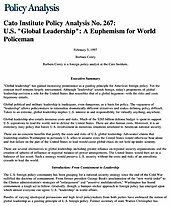“Global leadership” has gained increasing prominence as a guiding principle for American foreign policy. Yet the concept itself remains largely unexamined. Although “leadership” sounds benign, today’s proponents of global leadership envision a role for the United States that resembles that of a global hegemon–with the risks and costs hegemony entails.
Global political and military leadership is inadequate, even dangerous, as a basis for policy. The vagueness of “leadership” allows policymakers to rationalize dramatically different initiatives and makes defining policy difficult. Taken to an extreme, global leadership implies U.S. interest in and responsibility for virtually anything, anywhere.
Global leadership also entails immense costs and risks. Much of the $265 billion defense budget is spent to support U.S. aspirations to lead the world, not to defend the United States. There are also human costs. Moreover, it is an extremely risky policy that forces U.S. involvement in numerous situations unrelated to American national security.
There are no concrete benefits that justify the costs and risks of U.S. global leadership. Advocates’ claims that leadership enables Washington to persuade U.S. allies to assume costs the United States would otherwise bear alone and that failure on the part of the United States to lead would cause global chaos do not hold up under scrutiny.
There are several alternatives to global leadership, including greater reliance on regional security organizations and the creation of spheres of influence or regional balance-of-power arrangements. The United States would then act as a balancer of last resort. Such a strategy would preserve U.S. security without the costs and risks of an unrealistic crusade to lead the world.

This work is licensed under a Creative Commons Attribution-NonCommercial-ShareAlike 4.0 International License.
